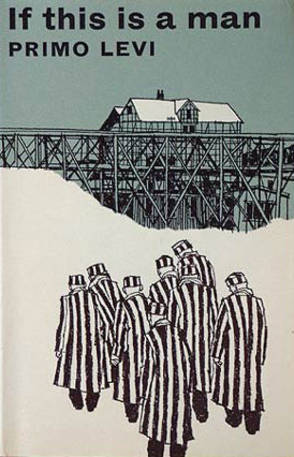


The third annual Primo Levi Symposium was held this past week at the Centro Primo Levi in New York. I was able to attend the first day of the three day conference and hear the speeches of the General Consuls of Italy, Germany and Israel as well as the Israeli Ambassador to the United Nations. I was also lucky enough to hear Andrew Viterbi's thoughts on his wife's cousin as well as the music of Tzvi Avni and his conversation with Samuel Alder. One of the most moving speeches was that of Mustapha Tlili of the NYU Center for Dialogues.
I found his description of what he wished for in the future extremely touching. I was embarrassed as I wiped away my tears but that often happens to me when I listen to people speak about the Holocaust.
It was interesting to see how far Primo Levi's works have reached and how he has influenced so many generations. I found it particularly touching to hear Italian Consul General Talo' speak of his own memories of reading Se Questo E Un Uomo when he was young and how that had taught him about the Holocaust. I also found the Consul General of Germany's words about how Levi made Germans face what had happened through his writings very powerful.
Of course, coming from an Eastern European Jewish family, I have my own family history to teach me about the Holocaust. Every year my father tells the same story about how his only surviving relatives ( two people out of a family of 80) made it back from the camps. They appeared at his doorway in the Bronx when he was 10 as he opened the door at Passover to let in the Prophet Elijah, part of our tradition. His shock was so profound that when he tells the story he gets the same shocked look I can imagine he had at that time. No one even knew these relatives had survived.
Being Jewish in Italy wasn't always fun, even in Modern Italy. Sometimes, it created misunderstandings and sometimes it just felt awful. There were also humorous moments. I will never forgot my first encounter with what I thought was anti-semitism in Italy,. I lived in Florence and all over the streets there were negative words written next to the letter JUVE. At that time, my Italian was terrible but my French was pretty good. I thought JUVE was the word for Juif or Jew. Little did I know that it referred to the rivalry between soccer team Juventus and La Fiorentina (La Viola). My boyfriend got a real laugh at my hysteria but for me, it was a relief to know I was wrong and that it wasn't anti-semitism but harmless fun. He also gave me my first copy of Primo Levi's book. I remember how much he cried reading that book and how he spoke with me about what it meant to him.
I learned quickly that being Jewish in Italy was somewhat complicated. While I never felt anti-semitism, I was uncomfortable with certain phrases that people seemed to use with impunity. Cheap like a rabbi was one that I heard very often as were silly comments about how all Jews are rich and about the Jewish lobby that runs America. Even good friends and people who I genuinely love and respect seemed to marvel at my discomfort with this stuff.
Over the many years that I lived in Italy, it became less of an issue but I did realize that there could be misunderstandings and that most offhand comments were made out of ignorance not meanness. Dialogue and education were the only remedies I discovered that could remedy this ignorance. Works by Primo Levi can be an aid in this vein and should be required reading in many nations.
Source URL: http://ftp.iitaly.org/magazine/focus/op-eds/article/primo-levi-symposium-reflecting-holocaust
Links
[1] http://ftp.iitaly.org/files/11633ifthisisaman1256790159jpg